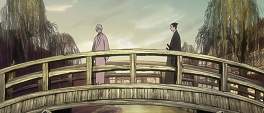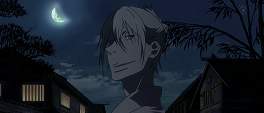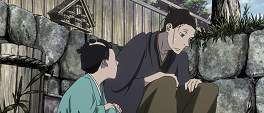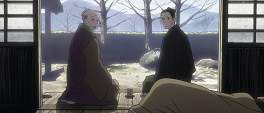Not to be confused with the horror novel, House of Leaves, House of Five Leaves sports a visually distinctive aesthetic that mixes painterly backgrounds with spindly, dark eyed characters. More effective in motion than in stills, the opening trio of episodes are methodically paced, carefully balancing the meandering story with character development - a cast of rogues that revels in the offbeat and avoids archetypes. Dealing with a variety of social and moral grey areas, the question of who the real villains are underpins a lot of narrative but it is the well crafted protagonist which keeps this series fresh and engaging.
Masanosuke Akitsu is a ronin down on his luck - unable to hold a steady job due to his perceived unreliability yet too proud to take on manual labour. His luck changes however when by chance he meets Yaichi, a mysterious and carefree man coincidentally on the lookout for a softly spoken but capable samurai to become his bodyguard. Masa's first encounter on the job however reveals an unsavoury side to Yaichi who it transpires is the head of the Five Leaves, a group which kidnaps members of rich families and demands a ransom for their return. Masa is conflicted about this turn of events and although Yaichi has a strange fascination towards him, he cannot in good conscience continue to work for them, even if they do feed him and he keeps company with their members. His unwitting hand in the kidnap of a young boy however may be enough to divorce him from the group for good.
In the dialogue-free opening moments of the series, it is the audio which is the most affecting. From incidental sound effects to the stunning background score, care and attention has been lavished on the sonics with the result that old Edo has rarely been this evocative. The music flits between the plucked strings of shamisen-style instruments to tracks that mix modern synthetic with traditionally old fashion sounds, sometimes even moving to a more stereotypically French influence. It is never less than fitting though and it is sublimely easy to sink into the soundscape and lose oneself in the backgrounds, crafted by Michie Watanabe who builds upon her work in series of a similar disposition such as Samurai Champloo. It is almost a shame when the vocals breach the rich background score, but with solid performances from the key roles including notable talents such as Daisuke Namikawa and Takahiro Sakurai, the disappointment is fleeting.
The motives behind Masa's story are familiar and touch upon a variety of stoically Japanese ideals. Most prominently is the search for a job and the need for sustenance which has been seen innumerable times in series such as Cowboy Bebop, and flourished in shows from the late 90's and early 00's after Japan's brutal recession; it is however a universal drive and integral to Masa's ambivalence as to whether to stay close or steer clear of the Five Leaves group. Just as important is Masa's pride: he bluntly refuses to undertake menial jobs, ones which he sees as beneath his samurai status, yet this is juxtaposed by his desire not to stand out - an idea perhaps foreign in anime that frequently features blue haired and buxom protagonists, but one integral to Japan's education system and overall mindset. How these two aspects will be developed in the story will be intriguing to see, as while they are not mutually exclusive, even in the first three episodes they give rise to some interesting situations and inner conflict.
Character designs are the most contentious issue for Saraiya Goyou, initially off-putting, the judiciously used animation gives the cast a delicate malleability that is worlds away from the fleshy bombast so many other series favour. The first three episodes demonstrate a series of refinement, willing to put flashbulb beauty behind slow burning development. Masa is an everyman caught between the need to sustain himself and retain his scruples, fundamentally opposed to the pragmatic and morally ambiguous Yaichi - the evolution and testing of Masa's ideals is the series' greatest selling point and at a digestible thirteen episodes it is perfectly paced to provide a complete and satisfying tale. Some may find it too slow or oblique to truly enjoy however it remains absorbing and fascinating viewing.







